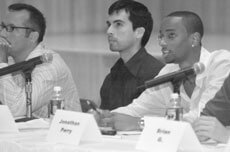Another gathering called by activists yields a large attendance and stories of hope
Roughly 300 people attended a July 13 town hall meeting, the fourth in a series of such gatherings on gay men, club drugs, and HIV.
“I was very happy with it,” said Dan Carlson who, along with Bruce Kellerhouse, has organized the events.
The meeting, held at the Fashion Institute of Technology, drew an audience that was more diverse, both ethnically and racially, and was younger compared to the prior three events, according to Carlson.
The first 90 minutes of “Barebacking, Drugs Internet Hook Ups: Is HIV Unstoppable?” were taken up with four panelists describing how they came to be HIV-positive and their struggles with drugs, unsafe sex, or both.
Michael K. described how he was diagnosed with HIV in 1984 and his years-long crystal meth addiction that led to unsafe sex.
“I did crystal for 15 years,” said Michael who is a recovering addict and therefore did not use his last name. “It has been a long, exhausting battle to get off crystal.”
Michael said that most of the sex he had during that time was unsafe though later in the evening he said that three longtime partners of his had not become infected.
“I had a total disregard for what I was doing, what I was doing to my body,” he said.
Jonathan Perry described what he believed was the actual sexual encounter with another man that led to his HIV infection after citing the dire statistics about HIV in the African-American community.
Christian Gonzalez said that his introduction to the gay community came through the Internet.
“I thought that all gay men wanted was sex,” he said.
He said he was usually able to find drugs, including meth and GHB, a highly addictive sedative, at circuit parties, the large events that many gay men see as drug-drenched, sex-filled bacchanals that last for days.
“I never used condoms when I was on the circuit scene,” Gonzalez said. He quit using after he became “a fucking mess,” lost friends, and overdosed twice. Gonzalez is HIV-negative.
Brian G., also a recovering addict, credited his arrest for dealing meth by the federal Drug Enforcement Administration in Boston with getting him off the drug.
“Last September, the DEA saved my life,” he said. “I had been dealing drugs for two years.”
Brian said he had a lot of unsafe sex during the years he was using meth and explained the fear that drove him.
“I was in tons of sex parties having lots of unprotected sex, but the thing that scared me was being the old, lonely gay man at the end of the bar,” he said. Brian said his story showed that HIV could be defeated.
“If HIV is stoppable in my life then, as a community, we can stop it,” Brian said, though he never disclosed if he was HIV-positive or negative.
Kellerhouse offered a perspective on the panel discussion.
“It seems to me that there is a segment of our community that is dancing as fast as it can, taking as many drugs as they can, hooking up with as many guys as they can, going to as many sex and circuit parties as they can… to keep the pain, the pain so bad, out of awareness,” he said. “There is collective group pain and lots of individual pain to go around.”
The final 60 minutes of the meeting were taken up with questions and comments that ranged from audience members talking about their own struggles with drugs or unsafe sex to suggestions about how best to respond to these issues.
The evening’s most poignant moment came when a 15-year-old girl, wearing a T-shirt reading “I’ve Got an Angry Inch,” an apparent salute to John Cameron Mitchell, the event moderator, said she came to the meeting because she had learned that her mother was infected with HIV and the virus that causes hepatitis C. The girl began to cry quietly after speaking and she spent the remainder of the meeting being comforted by friends.
Mitchell wrote, directed and starred in the film “Hedwig and the Angry Inch.”
The meeting showcased the deep community interest in these issues, and an urgency that has been palpable since last November when the first such panel was held at the Lesbian, Gay, Bisexual and Transgender Community Center. Following the July 13 forum, Kellerhouse said the group would soon turn from discussions to action.
“I’m encouraged when we have an event like this because for us this is untapped potential,” he said. “We need to take the interest generated through these events and turn that into action.”



































